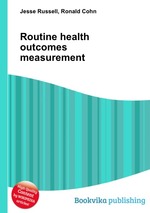Routine health outcomes measurement
Jesse Russell Ronald Cohn
бумажная книга
High Quality Content by WIKIPEDIA articles! Evidence-based practice describes a healthcare system in which evidence from published studies, often mediated by systematic reviews or processed into medical guidelines is incorporated into clinical practice. The flow of information is one way; from research to practice. However many interventions by health systems and treatments by their staff have never been, or cannot easily be, subject to research study. Of the rest, quite a lot is from research that is graded as low quality. All health staff intervene in their patients on the basis of both information from research evidence and from their own experience. The latter is personal, subjective and strongly influenced by stark instances which may not be representative. However when information on these interventions and their outcomes are collected systematically it becomes "practice-based evidence" and can complement that from academic research. To date, such initiatives have been largely confined to primary care and rheumatology. An example of practice-based evidence is found in the evaluation of a simple intervention like a medication. Efficacy is the degree with which it can improve patients in randomised controlled trials– the epitome of evidence-based practice. Effectiveness is the degree with which the same drug improves patients in the uncontrolled hurly-burly of everyday practice; data which are much more difficult to come by. Routine health outcomes measurement has the potential to provide such evidence.


